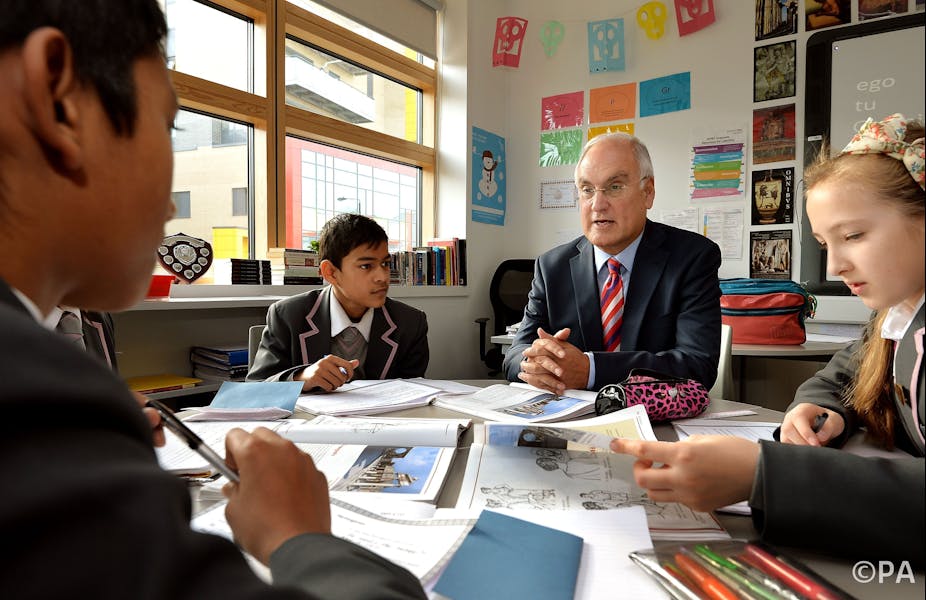It is not very often that an education story is the lead item on the BBC’s Today programme, but the apparent sacking of Baroness Sally Morgan as chair of schools inspectorate Ofsted and comments by its former head Sir David Bell was one such occasion.
It followed hard on the heels of news that Sir Michael Wilshaw, was “spitting blood” that elements associated with the Conservative Party, some with close links to education secretary Michael Gove, were briefing against the chief inspector of schools. Both Labour and Liberal Democrats argued that Gove was acting “politically” and that Ofsted’s “independence” was being compromised.
Westminster-based news correspondents enjoy a good old-fashioned political spat, but are often far less interested when it comes to the much more mundane activity of holding to account those with power, whether politicians or inspectors. Journalists can favour easy headlines over a serious discussion of complex policy issues.
But it is now increasingly apparent that the events which gave rise to the personal fallout between Michaels Gove and Wilshaw (now apparently patched up) have considerable significance for the future direction of education policy in England.
Gove running out of steam
At the heart of the dispute is an emerging tension on the political Right about the future direction of Tory education policy, and the next phase of their project to radically restructure state education in a way that both mimics the private sector, and opens up the public sector to private capital.
Thus far, Gove has proven to be the doyen of the Tory Right, a true Thatcherite in both style and substance. Certainly in terms of education policy, it is Gove who has carried the torch of the Conservative revolution, whilst apparently revelling in confrontations with the so-called educational establishment.
Consensus is apparently for the faint-hearted and success is to be judged by the extent to which teachers, local authorities and academics are antagonised. In much of this endeavour the two Michaels have been staunch allies, but as is often the case, over time the enthusiasm wanes and tensions emerge.
There have been suggestions that Gove is running out of steam in his current role. By modern standards he is an unusually long-serving secretary of state, and it may well be that it isn’t just Baroness Morgan who needs to be “refreshed”.
And as the next election looms closer, whatever the outcome of that vote, a change in role draws nearer and it is perhaps inevitable that the secretary of state begins to take his eye off the ball.
Tensions over role of the state
The real debate in the Conservative Party about education policy has very little to do with either of the two Michaels but is much more to do with what the next stage of the Tory education revolution looks like.
As Gove’s leadership falters, a struggle is emerging between those who seek to fill the vacuum that has appeared. Once again the tensions within the Conservative Party between its neoliberal and neoconservative instincts are becoming increasingly visible.
Much of this tension emerges in relation to the role of the state, and this is the reason why the role of Ofsted is at the centre of the disputes.
Thatcherite Conservatism has always been an uneasy balance between what Andrew Gamble described as the free economy and the strong state. Nowhere has this been more evident than with regard to education, because for all the rhetoric of decentralisation and choice, the reality has often been sharply different.
Markets (and marketisation) have been promoted aggressively, but centralised controls, not least in the form of the inspectorate, have always ensured that outcomes are not left to chance.

This was most graphically illustrated in the case of Downhills School where the wishes of the vast majority of parents for their school to remain with the local authority were denied. Rather we saw the state, with Ofsted at its heart, absolutely determined to drive forward the process of forced academisation (and ultimately privatisation).
Choice only exists as long as parents make the right choice. To paraphrase Henry Ford’s comment about his Model T: “you can have whatever colour you want as long as it is black”.
However, for those who seek a much more deregulated market in schooling, which is publicly financed, but privately provided, Ofsted has clearly become an impediment to progress, and hence the moves by some on the right to question its “fitness for purpose”.
In this scenario, a very different type of inspectorate is envisaged by the reformers. One which is unlikely to act as a block on new and radical types of school emerging, such as English versions of the virtual charter schools already established in parts of the United States. Take note: to see the future of English schools it is always better to look at New Orleans and Philadelphia rather than Finland or Shanghai.
It is clear that the news story about a spat between the two most powerful men in the English education system merely deflected attention from what is clearly a wider struggle for the soul of Conservative education policy.
The implications of this will become increasingly significant as the election comes closer and new personalities emerge. One can only hope that media coverage will ensure a much more detailed and critical discussion of policy, although there is little to give cause for optimism.
There is an urgent need to see through a frequently over-simplified debate and to recognise that the real issue in the English school system is a gaping democratic deficit in which power is exercised by too few people, and in ways that far too few people understand.
The challenge is to re-think what a much more democratic education system might look like. If we are to educate young people for democracy, then the education they experience must itself be democratic. Whether the English state education system is currently fit for this purpose is the question that really needs to be asked.

